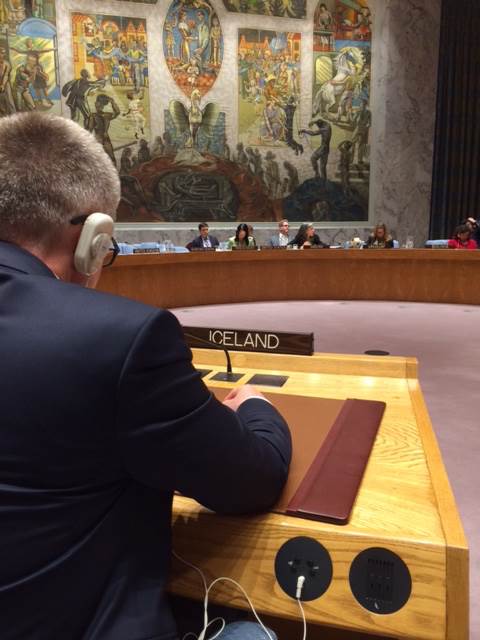Fastafulltrúi ávarpar Öryggisráðið um Miðausturlönd
Madame President
Allow me to thank the US Presidency of the Security Council for organizing this quarterly debate on the situation in the Middle East, including the Palestinian question.
Madame President
The Middle East region remains in a state of turmoil. Complex internal conflicts have led to displacement and suffering on a massive scale, with famine looming in many areas, including Yemen. The work program of this Council is heavily charged with issues of the region, with separate meetings and reports on various aspects of Syria, on Yemen, on Libya and on Iraq.
Iceland participated in the Brussels conference on Syria earlier this month. Along with many others we have committed significantly increased funds to alleviating the humanitarian impact of the Syria crisis. We have also welcomed Syrian refugees in Iceland, in coordination with UNHCR. The continued targeting of civilians and civilian infrastructure by the Syrian Government and rebel forces, particularly medical facilities is completely unacceptable. And use of chemical weapons at the beginning of this month,with strong evidence pointing to the Syrian Government, is outrageous. The perpetratorsof this act and of other acts which violate international law must be brought to justice.This is why the work of the OPCW/UN Joint Investigative Mechanism is of keyimportance and why Iceland supports the Syria Accountability Mechanism
(International, Impartial and Independent Mechanism to Assist in the Investigation and Prosecution of Persons Responsible for the Most Serious Crimes under International Law Committed in the Syrian Arab Republic since March 2011) .
The Security Council has a clear responsibility to end the conflict in Syria and pave the way for a political solution – the only way forward. All parties to the conflict have a responsibility for making peace negotiations work. In particular, this responsibility lies with the Assad government and its state backers, Russia and Iran. The hopes raised by the Astana process, and the energy put into the main UN sponsored Geneva peace process require concerted political energy and will.
Failure to establish a proper political peace process will cause continued suffering among the Syrian people and allow for the violence to further spread into neighboring states such as Lebanon.
Madame President
Despite the bleak outlook in much of the region, there is one conflict which should be amenable to resolution and where preventing further conflict should be possible. I am referring to the Israel/Palestine conflict. The two-state solution to the Israel/Palestine conflict is the only viable peace-plan – and it has been on the table for years. It should therefore be a key priority of the Security Council to protect and nurture the two-state solution, even when both parties to the conflict seem, at times, hell-bent on tearing this plan up.
On the one hand we have violent acts by individual Palestinians against Israeli citizens and the frequent firing of rockets into Israel – this is totally unacceptable. On the other hand we have Israel ́s constant undermining of the basis for a two-state solution through illegal settlements.
The Security Council took important damage control measures when it adopted Resolution 2334 last December. The resolution aims to safeguard a key prerequisite for the two-state solution – the possibility of a viable territory for the Palestinian State. We welcome the first quarterly report by the Secretary-General delivered orally on 23 March. Monitoring of the implementation of the resolution must continue.
Finally Madame President,
In line with paragraph 9 of Resolution 2334 we would urge an intensification and acceleration of international and regional diplomatic efforts and support aimed at achieving, without delay a comprehensive, just and lasting peace in the Middle East.
Thank you.

